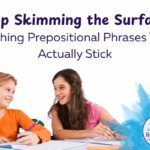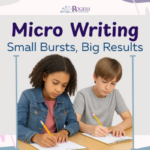One huge component of preparing for Guided Reading is selecting books to use with your groups, and this requires some quality thinking ahead of time! It is not enough to just choose an “M” book or an “average book” from the book adoption. When choosing a book, you must take into consideration why the students are grouped together and their interests and experiences.
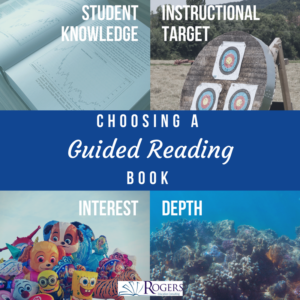
I consider four major components when choosing books. Some of them overlap and they’re clearly connected, but I intentionally think through each of these four components when choosing books for Guided Reading.
- Student Knowledge. Ideally, before you begin Guided Reading, you have done some kind of diagnostic (Fountas and Pinnell, STAR Renaissance, DRA, etc.) to get a ballpark of your students’ current reading levels. From my experience, all of these diagnostics (and several others) will do the same job, so I don’t think one stands out as being better than any others. The purpose of this diagnostic is to give you an IDEA of what the student’s reading level is. The results from the diagnostic test are the “science hat.” Once you have your scientific data about reading, you then put on your “teacher hat.” The teacher hat will allow you to think about what is going on with the student socially that might have influenced their
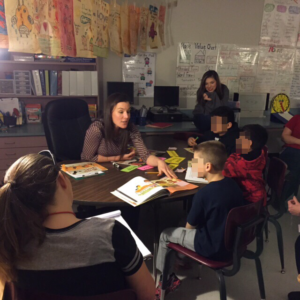 performance on the diagnostic – did they get enough sleep the night before the assessment, was it a story they were even remotely interested in, etc. Once you’re in the ballpark with students’ reading levels, the book you choose should be at their instructional level. It is important to continue to use your professional knowledge as you meet with your groups to continuously monitor the student’s reading level. During Guided Reading, conduct informal running records, pay attention to their reading skills and strategies. As you continue to choose books for the students, it will be important that the books are at the students’ instructional level, a little bit outside of their independent comfort level, but not so much it will be frustrating.
performance on the diagnostic – did they get enough sleep the night before the assessment, was it a story they were even remotely interested in, etc. Once you’re in the ballpark with students’ reading levels, the book you choose should be at their instructional level. It is important to continue to use your professional knowledge as you meet with your groups to continuously monitor the student’s reading level. During Guided Reading, conduct informal running records, pay attention to their reading skills and strategies. As you continue to choose books for the students, it will be important that the books are at the students’ instructional level, a little bit outside of their independent comfort level, but not so much it will be frustrating. - Instructional Target. “Targeted” is my new favorite education word (really anything is better than “rigor” right??). Small group instruction is great, yes, but targeted small group instruction is powerful! You have chosen the members of your reading group for a specific reason, which should be to improve their reading level. However, you should have a targeted reason why they are on their current level. Are they stuck at a level L because they all need help with vocabulary? Maybe they are all reading a level D and they need help retelling the story. Whatever the targeted instruction is, the book you select should help with this strategy! Carefully choose a book that will help in your targeted instruction.
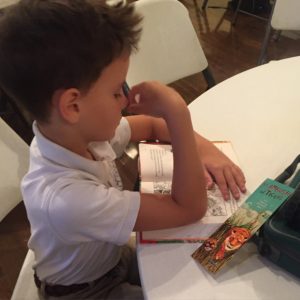
- Interest. Yes, this is important! We have all stared at mind-numbing Guided Reading books. You know what I’m talking about – boring books about Sam who tries on blue shoes, then red shoes, then yellow shoes. Or a long information-heavy text about hurricanes. Come on teachers! Can hurricanes be interesting? Yes! Are there books that make them the dullest natural disaster ever? Yes! Please take time to choose interesting books, don’t just choose a book because you have it! Some qualities I search for are appeal, high interest, interesting plot, and graphics. Always make sure that the students can relate to the book in some way. In other words, don’t choose a book about a baby brother, if all the students in the group are only children.
- Depth. I realize that the primary concern in Guided Reading groups is increasing student reading level, but again the book should have some depth. A lot of this is repetitive of the three points above but also look for natural language structures and concepts in the book. My main point here is that if the book is without depth, we teach kids to word call and not teach them the love of reading. Even the youngest child will enjoy a story with depth.
Guided Reading requires a lot of thought and planning from the teacher before conducting the group, this includes careful consideration of books. What do you look for when choosing books for Guided Reading?
